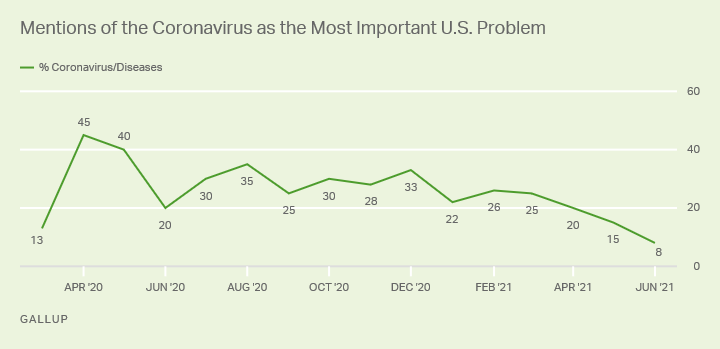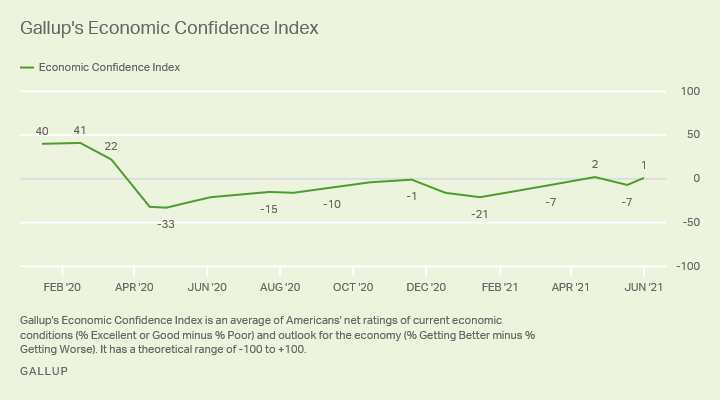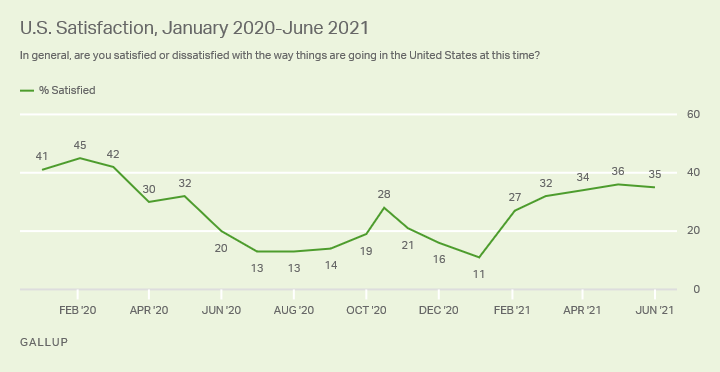Story Highlights
- 8% name COVID-19, down from 15% in May
- 22% cite government; 11%, race relations
- Uptick in Gallup's Economic Confidence Index to +1 from -7 in May
WASHINGTON, D.C. -- With Americans feeling increasingly optimistic about the coronavirus pandemic, just 8% now mention it as the most important problem in the U.S., the lowest point since it began. This is a decline of seven percentage points since May and 12 points since April. The highest percentage citing COVID-19 was 45% in April 2020, which is among the highest recorded by Gallup for any issue.

Line graph. Percentage of Americans mentioning the coronavirus as the most important problem facing the U.S., trend since March 2020. In June 2021, 8% mention COVID-19, the lowest on record, and a percentage that has been steadily declining since March 2021. The high of 45% was in April 2020.
The latest data, from a June 1-18 Gallup poll, mark the first time since the start of the pandemic that the coronavirus has not been one of the top two U.S. problems. Mentions of the government as the nation's top problem rose six points to 22%, making it the top overall problem in June. Meanwhile, the percentage of U.S. adults naming race relations remained steady at 11%, while slightly more Americans than in May named the economy and citations of immigration ticked down.
| May 2021 | Jun 2021 | May-June change | |
|---|---|---|---|
| % | % | pct. pts. | |
| Government | 16 | 22 | +6 |
| Race relations | 11 | 11 | -- |
| Immigration | 12 | 9 | -3 |
| Economy | 7 | 9 | +2 |
| COVID-19 | 15 | 8 | -7 |
| Gallup | |||
Government mentions dominated the list of national problems from 2017 through early 2020, but in April 2020, COVID-19 displaced it. The peak reading during the pandemic for the "government" category, which includes a mixture of concerns about the president, Congress and government dysfunction, was 29% in January, around the time protesters violently stormed the U.S. Capitol. The historical high in mentions of government as the most important problem is 35% in February 2019, which was just after the longest U.S. government shutdown ended.
As with many aspects of U.S. life, there is little partisan agreement on the nation's most pressing problem. Although government ranks as the top national problem for partisans of all stripes, Republicans (30%) are more likely to cite it than Democrats (23%) and independents (17%). The poll was conducted as senators in both parties negotiated an infrastructure bill and as a Democratic-sponsored elections bill failed in the Senate. Whereas immigration is the next-most-mentioned problem among Republicans, race relations ranks second for Democrats. Democrats, too, are more likely than Republicans to name COVID-19.
| Republican | Independent | Democrat | |
|---|---|---|---|
| % | % | % | |
| Government | 30 | 17 | 23 |
| Race relations | 3 | 10 | 16 |
| Immigration | 22 | 7 | 3 |
| Economy | 11 | 11 | 6 |
| COVID-19 | 4 | 8 | 12 |
| Gallup, June 1-18, 2021 | |||
Economic Confidence Rebounds After Dropping in May
Gallup regularly tracks Americans' ratings of national economic conditions as excellent, good, only fair or poor and whether the economy is getting better or getting worse. The combined responses are used to create the Gallup Economic Confidence Index, which has a theoretical range of +100 (if all respondents say the U.S. economy is excellent or good and that it is getting better) to -100 (if all say it is poor and getting worse).
After dropping in May to -7, Gallup's Economic Confidence Index has returned to positive territory, though just barely, at +1. The latest reading, which is on par with April's, is just the second positive score since the pandemic began in the U.S.

Line graph. Gallup's Economic Confidence Index, trend since January 2020. The current +1 reading, for June 2021, is up from -7 in May and -21 in January, as well as the -33 low in spring 2020.
The June increase is the result of modest improvements in both measures that make up the index. It follows the early June jobs report, which was more positive than the worse-than-expected report released in early May.
Satisfaction Stable and Relatively High
Americans' satisfaction with the direction of the country is essentially unchanged from the previous two months, and this marks the fourth consecutive month of readings above 30%. Satisfaction with the way things are going in the U.S. has more than tripled since January, when it hit its lowest point in a decade. Still, satisfaction levels remain lower than they were immediately before the pandemic began, and 63% of U.S. adults are currently dissatisfied.

Line graph. Satisfaction with the direction of the U.S. among Americans since January 2020. The satisfaction rating, 35% in June 2021, has been steady since March but is up 24 percentage points compared with January 2021.
As has been the case historically, satisfaction is often tied to partisanship and the party of the president. Currently, 61% of Democrats express satisfaction with the direction of the country, while fewer independents (32%) and Republicans (8%) do so.
Bottom Line
As more Americans receive COVID-19 vaccinations and most restrictions are lifted nationwide, they are less likely to cite the pandemic as the nation's most pressing concern. While the public is feeling more positive about the coronavirus situation, their view of government has worsened. Although President Joe Biden's job approval rating remains stable, approval of Congress has fallen in recent months.
Continuing attempts by Biden and congressional Democrats to come to agreement with Republicans on a sizable infrastructure package come at a time that economic confidence is just barely in positive territory; government is the most-mentioned problem facing the country; and satisfaction with the country's direction remains firmly entrenched in partisan politics.
To stay up to date with the latest Gallup News insights and updates, follow us on Twitter.
View complete question responses and trends (PDF download).
Learn more about how the Gallup Poll Social Series works.




